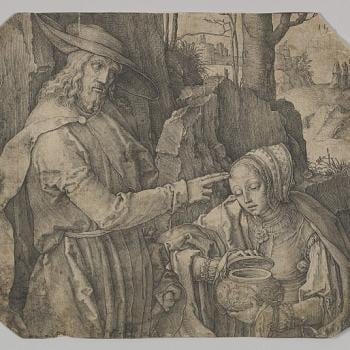The local Vedanta temple is undergoing a major building project, expanding from their old Victorian house to include a modern building connected to it. First Unitarian and the Vedanta temple have had long and positive relationships, and I’ve felt particularly welcomed into the community by their resident swami both as the minister of the Unitarian church, and as a person. Now, part of the ongoing festivities around this expansion will be a memory book of sorts and the swami has asked me to write a brief essay on the connections between Swami Vivekananda and Universalist and Unitarian congregations during his two visits to America at the end of the nineteenth century.
I’m working on this in this gap between Christmas and New Year, where our offices are closed and Sunday will feature a “stump the chump” question box in place of the sermon. (In case you’re unclear on the concept, blank three by five cards are included in the order of service together with an invitation to write whatever questions you think would be appropriate for the minister to respond to. They’re collected just ahead of the part of the service dedicated to the sermon and instead of that sermon, the minister, well, by which I mean, I read ’em in order as I get ’em and do my best to respond… A barrel of laughs and an occasional nugget of insight ensues…) The critical point is how I don’t have to prep the sermon, so, I have the time to do the research and hopefully get the paper written.
The paper itself is supposed to be around a thousand words. An interesting difficulty. I breath deep and there’s a thousand words. On the other hand there’s next to nothing actually available directly on the subject. So, some original research is being called for, which can be a real time suck. And I’m finding some interesting things along the way. I’ve been mining a chronology and while I’m not always sure if the church is Unitarian or Uniersalist, some names could be, and could be New Thought, a tradition which was just emerging at the time and their ministers frequently saw connections with what was being heard from Swami Vivekananda’s wondrous presentations. I am sure of quite a few of the churches with ambiguous names, and think maybe about some others.
So, far the big bit is that Swami Vivekananda’s first public speech was at a Universalist church in Massachusetts. Which is cool. But there’s also some kind of special relationship at the Unitarian church in Oakland. Or, at least, so think many Unitarian Universalists. Much to be pursued and not a lot of time…
And along with this little bit of historical research I’ve thought I also see something that might be useful in our contemporary Unitarian Universalist dialogue.
There’s no doubt of a burgeoning interest in the Buddhist dharma among UUs. I’m a living example of that.
As I try to unpack it, it seems the attraction for many is how Buddhism or at least the aspects of Buddhism that are attractive to Unitarian Universalists fall more or less into the broad philosophical category of pantheism. Not entirely, of course. The lead interest, I suspect, is around specific disciplines, zazen & vipassana first among them. But, close on it comes a spirituality based on the premise that everything is divine.
And that little word pantheism is a poor pointer to something rich. Our bare encounter with reality.
At the same time there is something else emerging within Unitarian Universalism. It tends to rely upon the images and metaphors of Christianity and the Jewish traditions. But, philosophically, at least from where I sit, it seems to be largely in alignment with panentheism. That is god is in everything. But, is not limited by that every thing.
That little word panentheism is a poor pointer to something rich. Our ecstatic encounter with reality.
It does strike me these two views, pantheism and panentheism are where the juice is in contemporary liberal religion, particularly as it is expressed within Unitarian Universalism.
Me, I am content with the everything is divine. The face for me is found in the ordinary. Dirt. Child. Sun. Moon. Day. Night.
But, I’m also very much aware that many of my friends and colleagues feel a deep connection to that “en.”
Finding the face within the extraordinary. Dirt. Child. Sun. Moon. Day. Night.
What my rummaging around the connections between Vedanta’s first out reach to the West has inspired me to consider, was how much value might there be for Unitarian Universalist theists and Christians to look a bit more deeply into the ancient Vedanta teachings and see how maybe there are some pointers along the way for them comparable to what the generally nontheist spiritual types are doing with Buddhism.
Might be helpful.
Could be something rich.
Too rich for some, no doubt…
But, that calling..
Our calling to God…
And God calling to us…
Sometimes proves to be irresistible…













